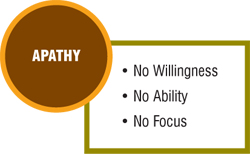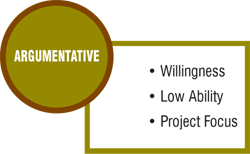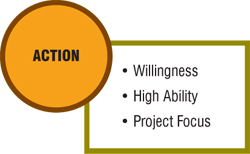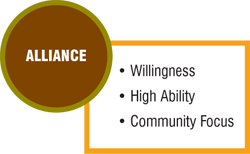EDSP Module 1: Civic Condition Assessment
| Civic Condition Assessment |
| Question: After we plan, will we implement our plan? |
| Challenge: Ascertaining the potential effects of the community's current political and power dynamics on the implementation of a strategic plan |
| Action: Participate in the Civic Condition Assessment |
| Result: Recommendations that can help the community organize and navigate the planning and implementation process based on its current civic condition |
The Building Communities planning process is conducted in seven sessions called Plan Week. During Plan Week, very specific activities occur including:
- Examining Key Success Factors for community and economic development (Session One)
- Identifying Quality-of-life Issues (Session Two)
- Examining the organizational capacity to advance development objectives (Session Three)
- Listening to the desires of the community (Session Four)
- Selecting Strategies and Quality-of-life Initiatives (Session Five)
- Assigning action steps for plan implementation (Session Six)
- Considering the overall aspirations and motivations of the community (Session Seven)
Sounds pretty complete, doesn’t it? Indeed, we believe that Plan Week considers the mind, heart and muscle of the community—the whole community.
But what if we told you that there is another major factor that predicts the likely level of success of the community in implementing its plan? What if you could predict the outcome of the planning effort before it even begins?
Don't get us wrong. We believe all communities should do such planning. However, through years of very close observation, we have developed the Four Stages of Civic Condition model, which provides insight into the underlying dynamics that form the foundation for successful (or unsuccessful) planning and implementation. These stages are shaped by the willingness and ability of the community.
Local reaction to the planning and implementation phases of the process is distinct and somewhat predictable depending on the community’s civic condition stage:
| Reaction to the Planning Process | ||
| Civic Condition | Planning Phase | Implementation Phase |
| Apathy | Engaging, Positive | Disengaged, Disinterested |
| Argumentative | Regimented, Controlled | Selective, Forced |
| Action | Engaging, Productive | Collaborative, Effective |
| Alliance | Studious, Complete | Deliberate, Purposeful |
 Apathy Stage. Communities in the Apathy Stage provide a fascinating study in the planning process. During the planning phase, people show up, show interest, participate and appear set for progress. Unfortunately, that is very often where progress stops.
Apathy Stage. Communities in the Apathy Stage provide a fascinating study in the planning process. During the planning phase, people show up, show interest, participate and appear set for progress. Unfortunately, that is very often where progress stops.
When the community shifts to the implementation phase, nothing happens. The proverbial “report sitting on the shelf” is the result (even the Building Communities process can have a tough time breaking through this condition and energizing forward movement).
 Argumentative Stage. Planning and implementation in the Argumentative Stage is very challenging.
Argumentative Stage. Planning and implementation in the Argumentative Stage is very challenging.
Typically, a small group of behind-the-scenes individuals desire to control most, if not all, aspects of the planning effort in order that their agenda becomes codified through a process that appears to be a collective community endeavor.
Communities in this stage can become bogged down due to a lack of consensus, lack of shared goals and the inability to attract resources.
 Action Stage. Strategic planning in an Action Stage community is a positive experience for virtually everyone involved.
Action Stage. Strategic planning in an Action Stage community is a positive experience for virtually everyone involved.
The planning phase reinforces existing efforts, inspires new initiatives and galvanizes teamwork.
The Building Communities methodology thrives, as action-oriented people desire and work toward the completion of an objective and comprehensive roadmap for their future.
 Alliance Stage. It is rare that a community evolves to the Alliance Stage. A paradigm shift from project-focus to community-focus characterizes this phase. It requires strong and sustained local leadership to achieve this condition. A planning process for a community in the Alliance Stage can be very successful, providing it does not become all-encompassing—planning only for the sake of planning.
Alliance Stage. It is rare that a community evolves to the Alliance Stage. A paradigm shift from project-focus to community-focus characterizes this phase. It requires strong and sustained local leadership to achieve this condition. A planning process for a community in the Alliance Stage can be very successful, providing it does not become all-encompassing—planning only for the sake of planning.
Unlike every other aspect of the Building Communities process, the Civic Condition Assessment is largely subjective. During this session, which can be held before or after Plan Week, participants develop an understanding of the Four Stages of Civic Condition model and take the Community Motivation Personality Test. Most importantly, community leaders discuss how their community stacks up in terms of its civic condition.
By surfacing these underlying dynamics, the community not only becomes more aware of the significance of underlying political and power dynamics, but it can use that knowledge to better navigate the implementation phase of the work more effectively.
©2025 Building Communities, Inc.






